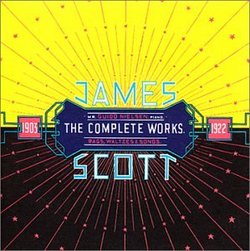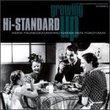| All Artists: Guido Nielsen Title: James Scott: The Complete Works 1903-1922 Members Wishing: 0 Total Copies: 0 Label: Basta Records Release Date: 10/16/2001 Album Type: Import Genres: Jazz, Pop Style: Traditional Jazz & Ragtime Number of Discs: 2 SwapaCD Credits: 2 UPCs: 723724333628, 8712530910026 |
Search - Guido Nielsen :: James Scott: The Complete Works 1903-1922
 | Guido Nielsen James Scott: The Complete Works 1903-1922 Genres: Jazz, Pop
Ragtime has its loyal fans but doesn't get much attention from most modern listeners. It's often thought of as the generic saloon music you hear in Westerns and other period movies. But ragtime was one of the building bloc... more » |
Larger Image |
CD DetailsSynopsis
Amazon.com Ragtime has its loyal fans but doesn't get much attention from most modern listeners. It's often thought of as the generic saloon music you hear in Westerns and other period movies. But ragtime was one of the building blocks of early jazz, and the form is far from artless. Composer, arranger, and pianist James Scott was born in 1885 in southwestern Missouri, a ragtime hotbed. This beautifully packaged, finely annotated double CD traces Scott's development as a composer of piano rags. The earliest pieces, "A Summer Breeze" and "The Fascinator," date from 1903 and show the influence of ragtime legend Scott Joplin on the then-18-year-old Scott. Just six years later, Scott wrote "Grace and Beauty," an elegant piece that demonstrates the young composer's strong command of structure. Later pieces show Scott subtly expanding the form. "Rag Sentimental" strikes the ear with its minor key sonorities, while the quirky "Pegasus" should do much to dispel the uninformed notion that all rags sound alike. Throughout the album, Dutch-born pianist Guido Nielsen brings his virtuoso talents to this jaunty and physically demanding music. The Complete Works is a must for ragtime collectors and an eye-opener for all kinds of music lovers. --Fred Cisterna Similar CDs
|
CD ReviewsGlad it was done, but some qualms B. FILBERT | Oregon, USA | 08/29/2005 (4 out of 5 stars) "I have been waiting for more than twenty years for this recording. I first heard James Scott's works in the 1970's, and hoped that there would be a "complete works" recording. So, I am very glad this has finally happened. First, let me say what I like about this recording. 1) It covers all of Scott's compositions (at least the ones we know of, and that are completely by him). 2) The notes that come with the recording are very well done and interesting. 3) The discs themselves are quite attractive (much effort went into this whole endeavor to give it a complete and consistent look and feel). 4) The sound on the recordings is very good. Now my qualms. I tend to agree with the review that felt Mr. Nielsen's range of expressiveness is too limited. After hearing these pieces played by others (recorded and live), it seems that the pianist here simply has come up with a rather rigid formula for interpreting Scott's rags (the songs and waltzes are allowed a bit more freedom). For some of these rags, this jaunty, rather chipper style works well. For others (I'm thinking particularly of the Troubadour Rag and "Modesty" here - both of which have received richer, more nuanced recordings elsewhere), it doesn't. While Scott is clearly not as varied and subtle a composer as Joplin or Lamb (there is no frequent thread of melancholy, striving for innovation, or a sense of the "outsider looking in" quality I find in much Joplin and some Lamb), his later works allow for much more variety of interpretation than we get here. Sometimes, especially on the second disc, it sounds uncomfortably like a player-piano. So, I would recommend this to anyone wanting to learn more of the core Classic Ragtime literature, but I hope that other recordings will eventually be made to explore this repertoire from a slightly more nuanced perspective." Sheer magic! "Gimpy" Peach Johnson | 12/12/2003 (5 out of 5 stars) "Wow! That's it. Wow! This is a REMARKABLE two-CD set collecting the complete works (rags, waltzes, and songs) of James Scott--except for "Calliope Rag" which has been attributed to Scott (and Bob Darch who supposedly finished the piece from an incomplete manuscript). Others here have likened Guido Nielsen's interpretation of Scott's music with the legendary recordings Joshua Rifkin made of Scott Joplin in the 1970s, and that's certainly appropriate. James Scott has been ignored by those recording ragtime for too long, possibly because his pieces are so difficult to play (I play a few of them myself). Guido Nielsen plays these rags so gracefully! He plays the music as written (no embellishments), and proves that the pieces have plenty of pep and richness on their own. This is exciting ragtime music, played in concert style on a full-sounding piano, NOT some rinky-tink out-of-tune bar room piany. The accompanying booklet is worth the price alone. Its 36 pages are printed in full-color with the most extensive liner notes I have ever seen for a two-CD set (many thanks to Mr. Galen Wilkes!) We get the most complete biography of Scott available today, and detailed commentaries on each piece, along with a healthy dose of color reproductions of original sheet music covers. This entire production is top-notch, obviously a labor of love. Anyone with an interest in ragtime, early jazz, or classical music (and YES, I would consider this a type of classical music) should have this set. I can't begin to fathom the work that went into the production of this set, and I am extremely grateful to those involved for such an amazing tribute to James Scott that is long overdue." Great Scott aburns57 | Colorado Spring, CO United States | 05/28/2003 (5 out of 5 stars) "James Scott seemed almost like a rumor . . . you could read about the legend in They All Played Ragtime and subsequent histories of the genre, and you could hear piano rolls (not even made by Scott himself) and even an occasional recording on a miscellaneous ragtime collection . . . but it just didn't seem possible to get an adequate overview of the man's works.Until now. Guido Nielsen has performed a huge favor for fans of classic ragtime by recording the complete works of this important but neglected composer. The sound is great, the playing is invigorating, idiomatic, and first-rate, and the liner notes are an ample and informative bonus. You simply couldn't ask for a more ideal tribute to this marvelous composer. If you love the great recordings of Joplin's music, this two-disc set should be an automatic purchase.No, Scott isn't *as* great or original a figure as Joplin, but his work is distinctive--typically livelier and more virtuostic than Joplin's. Scott tossed off such fare as the Liszt Hungarian Rhapsodies while still a teenager, and his principal devotion was to the extroverted style of "The Maple Leaf Rag" rather than to that of Joplin's later, more subtle and refined works (e.g., "Gladiolus Rag", "Solace", "Magnetic Rag"). But Scott does have his intimate moments . . . and unerring taste.Like Joplin and Lamb, Scott's genius seemed perfectly suited to the strict ragtime form, even if in his later works Scott tends to favor three rather than the typical four strains. At least half a dozen of his rags--"Frog Legs", "Grace and Beauty", "The Ragtime Betty", "Quality", "Troubador", and "Broadway"--rank with the very best (and heaviest!) ever written. (Every Scott fan will probably want to add a few more to the list . . .)Nielsen's set gives us a rare opportunity to appraise the total achievement of an undeservedly neglected figure who will remain of permanent interest to fans (and historians) of American music. Bravo!"
|

 Track Listings (19) - Disc #1
Track Listings (19) - Disc #1

